03/15/2024
Corporate Team Building Guide
Company culture and corporate team building are far more than empty buzzwords you hear around the office. These tangible concepts can transform your employees into a highly effective team. You can explore leadership styles, values, expectations and goals when your company emphasizes team building positively — and you get to do so as a united front.
Through team building, companies have the opportunity to foster a productive and collaborative environment that thrives on trust and authentic support. Explore this comprehensive corporate team-building guide for insights into best practices and inspiring ideas.
The Value and Impact of Team Building

Corporate team building identifies and develops new leaders, creates a healthy and enjoyable working environment and highlights strengths and weaknesses so that you can break new ground for your company.
Understanding the Benefits of Corporate Team Building Activities
The temptation to focus solely on fun and games for team-building activities is genuine — and while there’s nothing wrong with making corporate activities as enjoyable as possible, you can sometimes miss out on the incredible benefits you could enjoy from well-thought-out activities. Consider these advantages of team-building events:
- Enhancing communication: Team-building activities allow teams to improve trust and communication skills. The lighthearted nature of many activities creates space for staff to open up about how they feel. The collaborative nature of other games requires staff to communicate with each other effectively to complete their goals. Activities are also a great way to learn each other’s communication styles and share ideas on understanding one another more clearly.
- Boosting morale: Your team members enjoy a break from routine when you carve out space for fun and productive company activities. Stepping out of routine to do something enjoyable and different, reminding staff of their potential, helping them form new connections, and even incentivizing activities are all ways team exercises can boost morale.
- Improving team performance and productivity: You can use team building as a simple but effective way to refresh individual and company goals. Company events can remind staff of what you are all working towards and encourage your team to keep going after goals.
- Networking and socializing: Making space for team-building exercises can be especially beneficial for large companies, but they are also just as helpful for anyone who is new in the company. Fun company events help staff socialize in a relaxed setting. Teams can form new networks and even build new friendships through company activities.
- Unify departments: Another benefit of team-building activities is that they can bridge the gap between departments. In setting up the exercises, you can either group teams by department to solidify bonds within the existing squad or pair staff with members outside of their department to form new, company-wide connections.
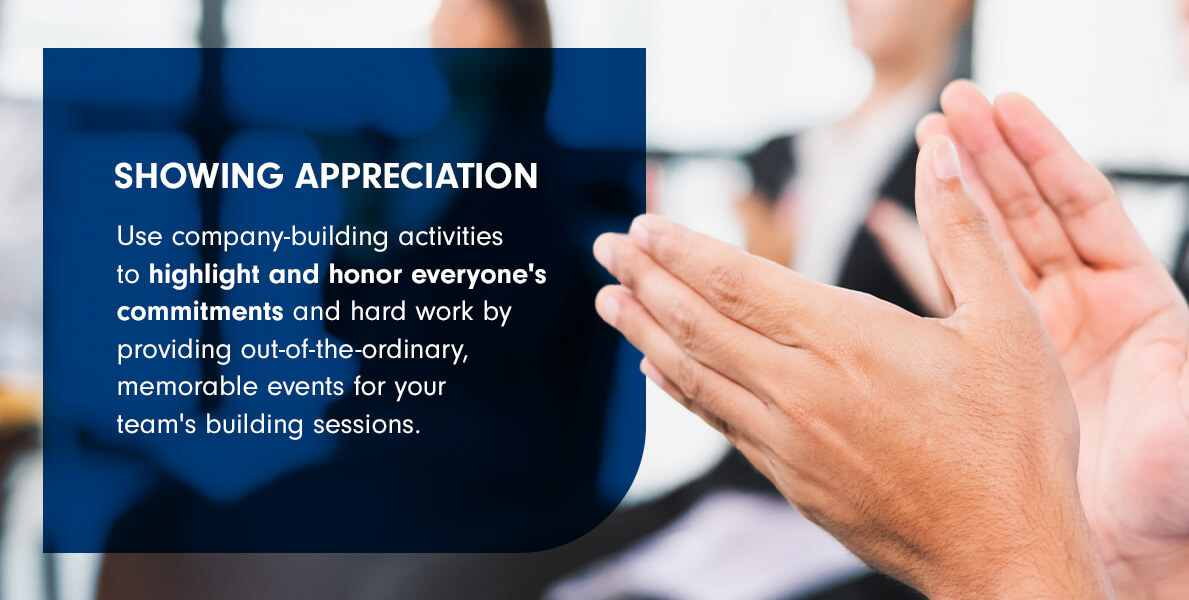
- Showing appreciation: Team-building exercises can also show your team that you appreciate them. Use company-building activities to highlight and honor everyone’s commitments and hard work by providing out-of-the-ordinary, memorable events for your team’s building sessions.
- Solidifying company culture: Company culture is a reflection of your organization’s ethos, vision, norms and attitudes and how you put that into practice. Try creating team-building activities that solidify your core values and address issues within the company that hinder the desired culture. For example, you can build a workshop on the importance of mental wellness at work or activities centered on growth and confidence in the workplace.
- Increasing engagement: Because of all the built-in benefits of company events, your team can start feeling more engaged. Team building helps staff actively participate and think out of the box. These advantages all lead to members being more focused and involved.
- Pinpointing strengths and weaknesses: As a manager, team building can be effective in highlighting employees’ strengths and weaknesses according to how they perform in some activities. Of course, the results may not always be an accurate or comprehensive reflection, but they can give you insight into what to commend and what to address. In discovering strengths and weaknesses, you also have the opportunity to identify leaders.
- Encouraging collaboration and creating a team spirit: The only way to accomplish the goals you set in company activities is by working together, and this builds a culture of collaboration within and across departments. Building exercises also foster a team spirit as everyone comes together to have fun, cheer one another on and celebrate achieving goals as a unit.
- Employee retention: Successful team activities help staff form healthy connections, learn new skills and feel appreciated — all of which lead to greater employee satisfaction and higher employee retention.
Tackling the Question: Are Team Building Activities Worth It?
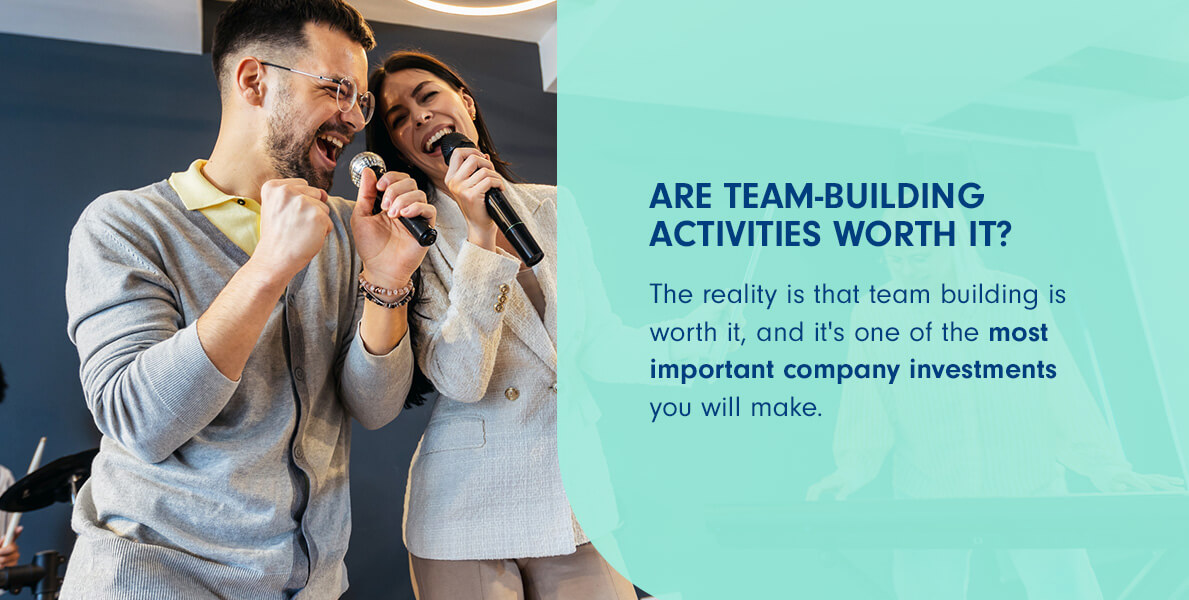
You have probably seen that, among staff, opinions on team building are divided. But the reality is that team building is worth it, and it’s one of the most important company investments you will make. There are so many advantages to team-building events that build core company values and far outweigh any downsides, such as time away from work, costs or resistance to change. The key is making company activities worth it for everyone, and the most effective way to do that is to incorporate organic, unique activities that make sense for your company.
The other question is if team-building activities are worth it financially, and the answer remains — yes! Though some activities can admittedly be a bit elaborate, think of them less as a splurge and more as an investment that can improve everything from productivity and morale to employee retention.
The Crucial Role of Leadership in Team Building
Company activities place a lot of emphasis on collaboration and strengthening teams — and this is crucial to a healthy and productive work environment. But another essential facet of team building is leadership. Leaders are vital to hosting a successful team-building event, and successful team-building also identifies and develops new leaders.
Most importantly, team building is a leadership quality, and leaders play a crucial role in teamwork on a daily basis. Enjoying an increase in productivity and morale after a company event is the easy part — but keeping that boost going beyond the team-building festivities is where a quality leader shines. You can find ways to include elements of team building in your daily or weekly routines. For example, you can encourage your team to huddle at the start of each day or to share their list of goals at the end of each week.
How Leadership Fosters Effective Teamwork
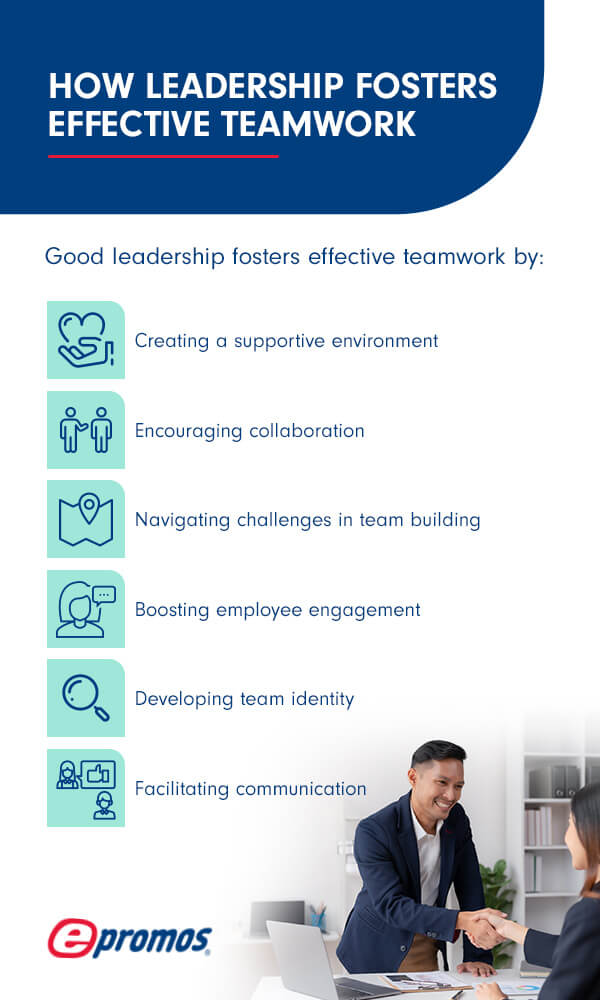
There is a clear link between leadership and teamwork. A skilled leader is able to create an environment where staff feel recognized, supported and valued. Good leadership fosters effective teamwork by:
- Creating a supportive environment: Help your team by being the kind of leader that they can share their individual goals with or approach you with their concerns. When your team knows that they have your support, you also gain their trust. Knowing that they can trust you also unifies your team — there is no worry that you are pitting them against one another or playing favorites. With your support and your trust, your staff have the capacity to support one another and that makes for strong teamwork.
- Encouraging collaboration: Promoting collaboration in your department and with other departments is one of the most effective ways to create synergy and increase productivity. Though each employee is responsible for their own work, your department can enjoy an uptick in productivity by encouraging staff to tackle big projects together. Collaboration helps everyone break down tasks and contribute in ways that play to their individual strengths. You can get projects done more efficiently, and you develop stronger connections within your team.
- Navigating challenges in team building: Every team faces unique challenges. For some, resources or lack of opportunities may be an issue. For others, interpersonal relationships may be causing conflict and affecting teamwork. Stepping into challenges means identifying obstacles and using your leadership to resolve disputes and present solutions that unify your team.
- Boosting employee engagement: When you are an effective leader, your staff is more engaged in their work and are more likely to put in the effort to engage with one another. There are various ways that you can increase engagement. Checking in with employees regularly models your involvement in the team and keeps you in the loop on how the team is functioning together.
- Developing team identity: One of the greatest privileges of leadership in team building is being able to develop your team’s identity and align that with company values. You have insight into your team member’s strengths and how that reflects company-wide brand. Those insights can help you carve out a team identity that represents the best in each member.
- Facilitating communication: Quite simply put, teamwork is not possible without communication. Clear communication keeps relationships within your team healthy, builds transparency and trust, reduces conflicts and allows space for meaningful discussions that can lead to innovation. As a leader, your skills help facilitate communication in your team and across the company.
Choosing the Right Team-Building Activities for Your Company
The beauty of team building is that there are various methods to choose from — each with a purpose it fulfills — making it easy to incorporate events that suit your company best. Depending on the events and activities you use for team building, you can boost team spirit, improve communication, address issues and concerns, build trust or develop problem-solving and leadership skills.
Aligning Activities With Corporate Goals

Follow these easy steps to choose suitable activities for your company:
- Identify your team’s needs: Each team’s needs differ — one group will need to hone in on productivity, while another should focus on problem-solving or creativity. Consider the areas the team would like to improve or the challenges that they would like to address. An easy way to do this is to ask what the team’s goals are and then develop activities that help achieve those goals. You can also look at developing activities that suit not only the group’s goals but also your team’s identity.
- Choose the right format for activities: What format would best suit your group? Can you achieve your goals by having a formal or informal event or events in the office or outside of the office? Will virtual events work for you, and would long or short activities accomplish your goals? Also, consider which options are best for your budget and time constraints.
- Align activities with company goals: The most effective team-building activities are those that impact your company in a meaningful way. Align activities to your company’s goals and values to get the most out of company events. If your company’s goals and values center on innovation, you focus on activities that promote thinking outside of the box or exercises that teach new skills.
- Build an inclusive plan: The next step is ensuring that no matter which activities you land on, you make them as inclusive as possible. Consider ways to involve work-from-home staff members and workers with different abilities.
- Get feedback: Ask your team for feedback before and after the team-building event. Asking for feedback before the event can give you insight into any areas you may have missed while setting up.
The Art of Incorporating Company Branding Into Team Building Activities
Company branding can play an essential part in your team’s activities. Naturally, you can include your branding when you set up activities — tablecloths, gazebos and the usual. Another excellent idea is to incorporate your branding as part of giveaways or prizes for completing team-building exercises or as complimentary gift bags for every member who participates. Having prizes or gift bundles is an easy way to show staff that you value them and appreciate their participation.
Take a look at these ideas for team-building gifts that seamlessly fit into team-building events:
- Personalized t-shirts or hoodies: Wearing custom shirts for your team building is an easy way to bring unity to your team, proudly showcase your branding and provide your staff with a practical freebie they can always use. Apparel like golf shirts are an excellent option — you can dress them up or down, and they suit indoor and outdoor functions. If you would like something more casual that you can include in a gift bag, custom t-shirts are always a popular choice.
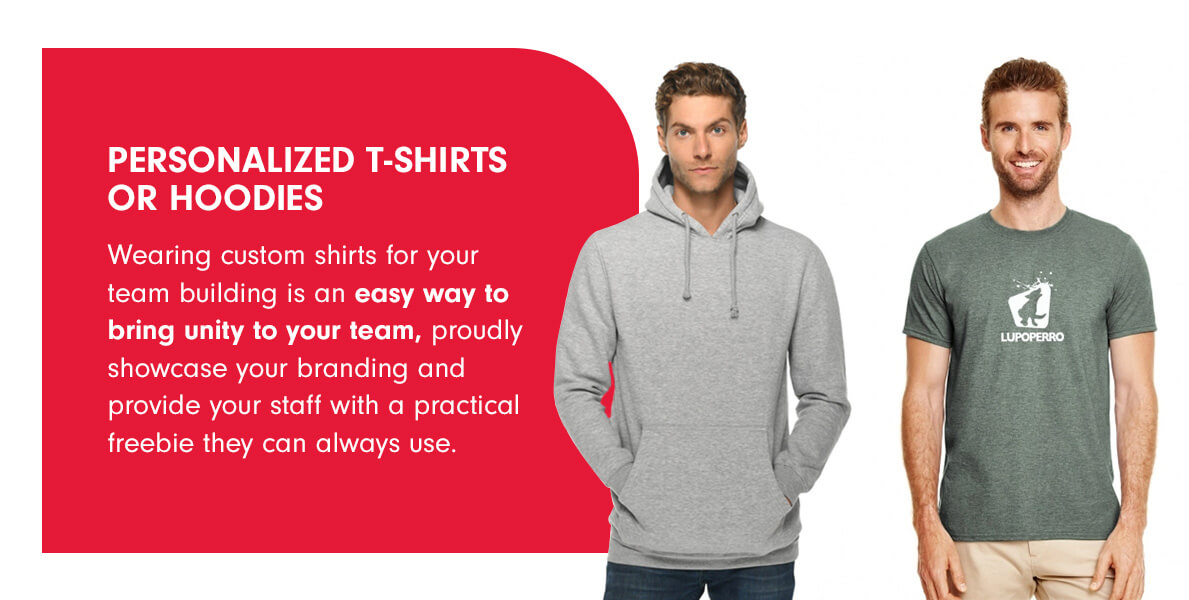
- Custom tote bags and briefcases: A custom tote bag serves a double purpose — your staff can use them every day and you can use them to package gifts or team-building resources. You can also gift custom briefcases for a sleek, professional option that your staff will love.
- Branded water bottles: Water bottles are another easy gift idea that you can present at the team building or include in a take-home gift bundle. Choose custom water bottles that are antimicrobial and BPA-free.
- Snack gift baskets: Food gift boxes are always a hit and easy to assemble with a few long-lasting snacks like chocolates, candies and popcorn. You can also opt for a ready-to-go, custom food gift basket. Very important — remember to check if any employees have food allergies or restrictions and hot weather where chocolate may melt.
- Custom tumblers or coffee mugs: Personalized coffee mugs are a practical gift that team members can use at the office or at home. Coffee mugs are affordable, practical and long-lasting. Choose from a nice variety of mugs to best suit your team building, including travel mugs and tumblers, ceramic coffee mugs and campfire mugs.
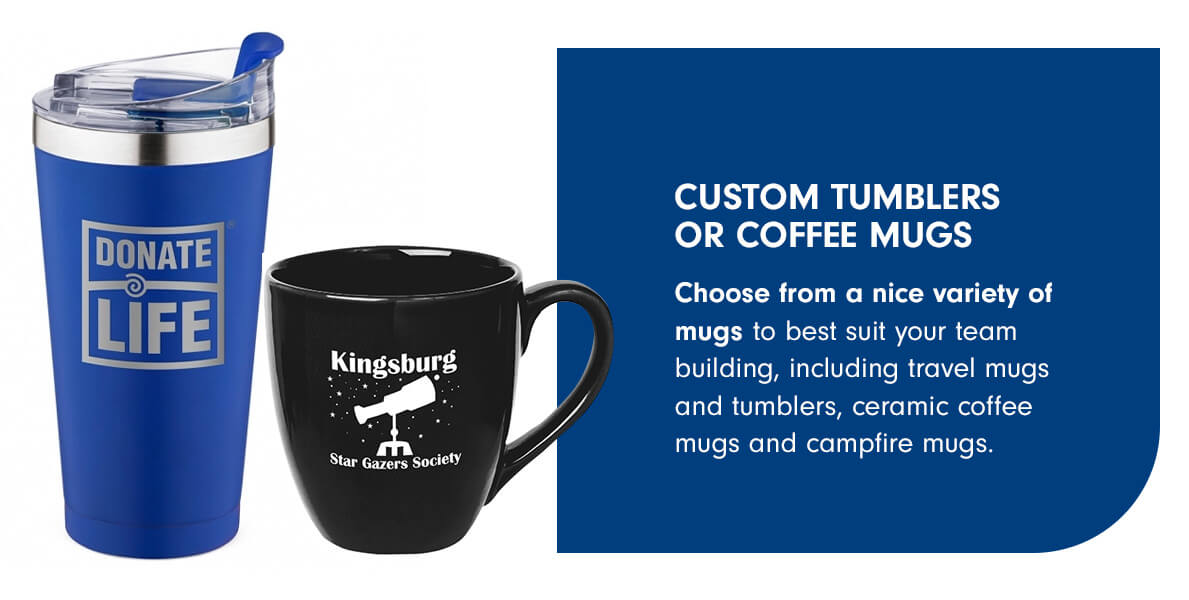
- Desk organizers and writing sets: A custom desk organizer can make the perfect corporate gift for a team-building event centered on productivity, while a writing gift set perfectly matches team building activities for creativity and brainstorming.
- Lanyards and badges: If you have a large team, you might consider providing each employee with a branded lanyard and badge to display their name and department to help everyone get to know each other more easily.
Budgeting for Success: How Much Should Your Company Allocate for Team Building?
A good way to calculate how much you should spend on team building is to multiply how much you spend on total salaries annually by 1% to 3%. Budgeting based on total salaries has always been an excellent way to determine a training budget. Well, not all team-building events involve training, they are investments that enrich your team. Working around calculations for your training budget simply gives you a solid starting point to figure out your budget.
Also, keep in mind some of these costs of team building and training that you should include in your budget specifics:
- Team building venue costs
- Travel costs
- Catering for the function
- Accommodation if you are going on a company retreat
- Printing, supplies and other resources
- Guest speaker fee
- Costs of gifts and prizes
Tips and Tricks for Organizing Successful Team Building Events
A successful team building event is one that doesn’t feel like another day at the office. Do away with the intrusive icebreakers and awkward games. Instead, aim to create a unique, positive experience that also leaves your staff feeling appreciated and enriched.
The Essentials of Planning and Execution
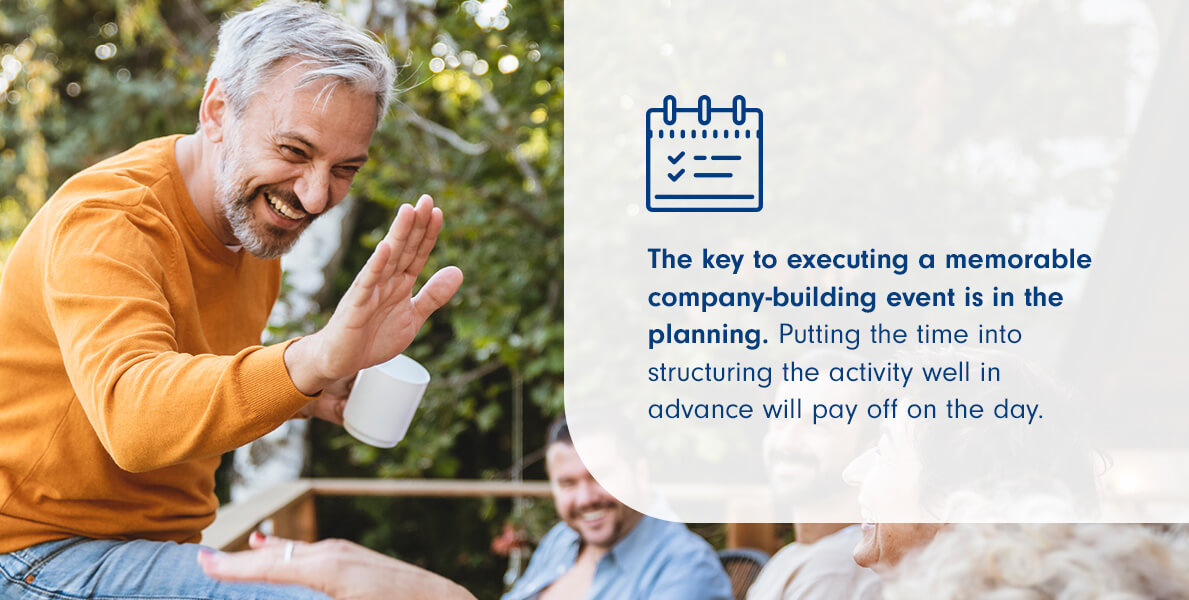
The key to executing a memorable company building event is in the planning. Putting the time into structuring the activity well in advance will pay off on the day.
For many leaders, sticking to a budget is the most crucial part of planning a team-building activity. Collaborate with your financial department to go over your initial plan for the event, assess all the resources you will need and agree on a budget. It’s crucial to note that even though team building is vital to a thriving company, you do not need to overspend to host a successful event.
With your budget in mind, you can now move to finding a venue. You can, of course, opt to have your function at the office — especially if there are financial or time constraints to consider. If you have the go-ahead, hosting your event at an outside venue can contribute to the success of the day. An outside venue allows your team to break away from the office and enjoy the activities in a less formal setting. When searching for a venue, go after one that has space for indoor and outdoor activities, all essential amenities and an assortment of catering options.
Also, ask your venue about which supplies they provide, such as Bluetooth® speakers, whiteboard and markers, pens and notepads. This way, you know what is included in the venue’s price, and you are aware of what you need to provide for the activities.
After booking your venue, set a date and allow employees sufficient time to RSVP. Have a cut-off date for responses so that you can get back to the venue with a final tally for seating and catering purposes. This will give you a final number for how many people to provide resources and gifts for.
The final step is drawing up an agenda for the day. Include time for introductions, activities, training times, workshops, talks, refreshments, meals and giveaways at the end of the day.
Common Mistakes in Planning Team Building Events
Sometimes, the best way to plan for success is to learn from mistakes! The following are a few common mistakes to avoid in planning company events:
- Planning at the last minute
- Having unclear objectives and an unclear agenda
- Choosing activities that don’t match your group or company values
- Failing to share the agenda with the team
- Neglecting to provide swag or gifts
- Making the team building feel like just another day at work
- Focusing solely on one aspect of team building
Innovative Ways to Boost Employee Engagement Through Corporate Team Building
Engaged employees are dream employees. When your team is engaged, they display enthusiasm and participate more readily, collaborate more easily and are more productive — all the things you want for your staff and the company!
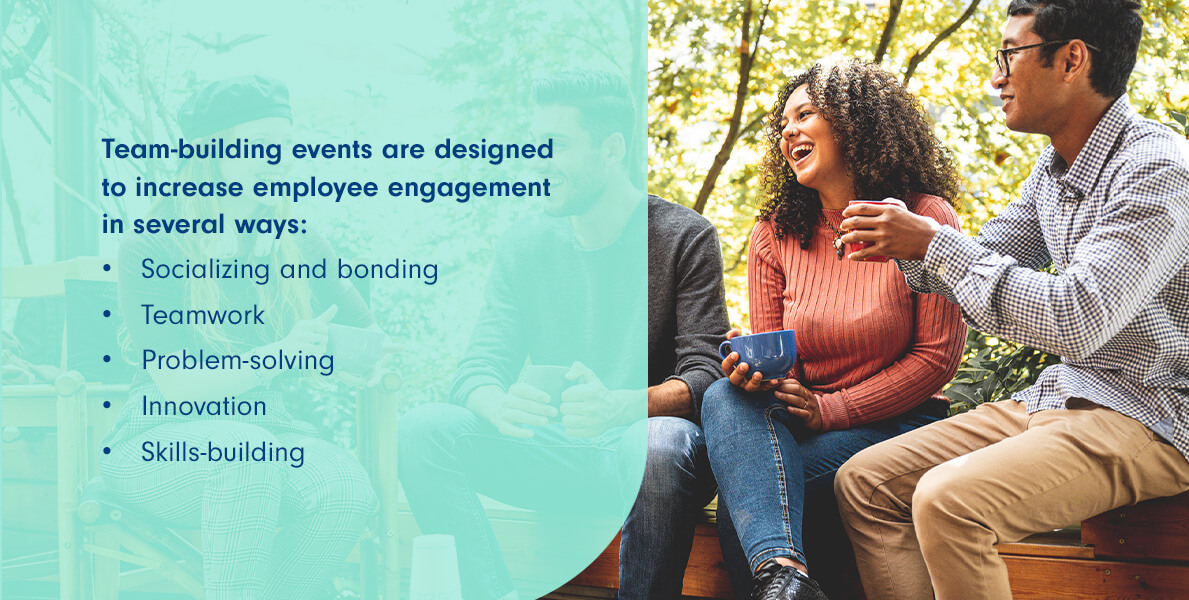
Thankfully, team-building events are designed to increase employee engagement in several ways:
- Socializing and bonding: Staff are more engaged when they can connect with other members and share their ideas and experiences.
- Teamwork: Coordinating with other individuals or with other departments helps everybody participate and work to achieve common goals.
- Problem-solving: Challenges can lead to stress and less productivity and participation. Adding creative problem-solving to your team-building exercises gives employees a chance to share their solutions in an informal environment.
- Innovation: Creative team-building events can foster innovation. Productive brainstorming and the feeling of breakthrough are effective at engaging employees.
- Skills-building: You can keep staff engaged by presenting new skills in an exciting and relatable way.
Team Building Ideas
Inspire your team with these fun company event ideas for employees to have an enjoyable and fruitful time. Some outing ideas include:
- Escape room: In an escape room, teams work to solve a series of puzzles that will lead them to a key that “unlocks” the room. Escape rooms are an ideal team-building exercise because they are a ton of fun and effective for building communication, teamwork, problem-solving and decision-making skills! There are also virtual escape rooms that are a good team-building option for your work-from-home or hybrid staff.
- Go-kart racing: Give your team a fun day out by going go-kart racing. Go-kart racing is an enjoyable activity that gets all those feel-good hormones racing, too. Racing is something different and exciting. Plus, go-kart racing is an easy way to get everyone into a team spirit as you cheer each other on in the race. You can race in teams or individually to foster some friendly competition and set the tone for a great day of team building.
- Company retreat or camp: A company camp or another type of retreat may not immediately seem like team building, but it certainly has the potential to be if done correctly. Retreats give employees a much-needed break, show your appreciation and boost morale. Keep the focus on team building by including workshops, games, brainstorming sessions and meals together.
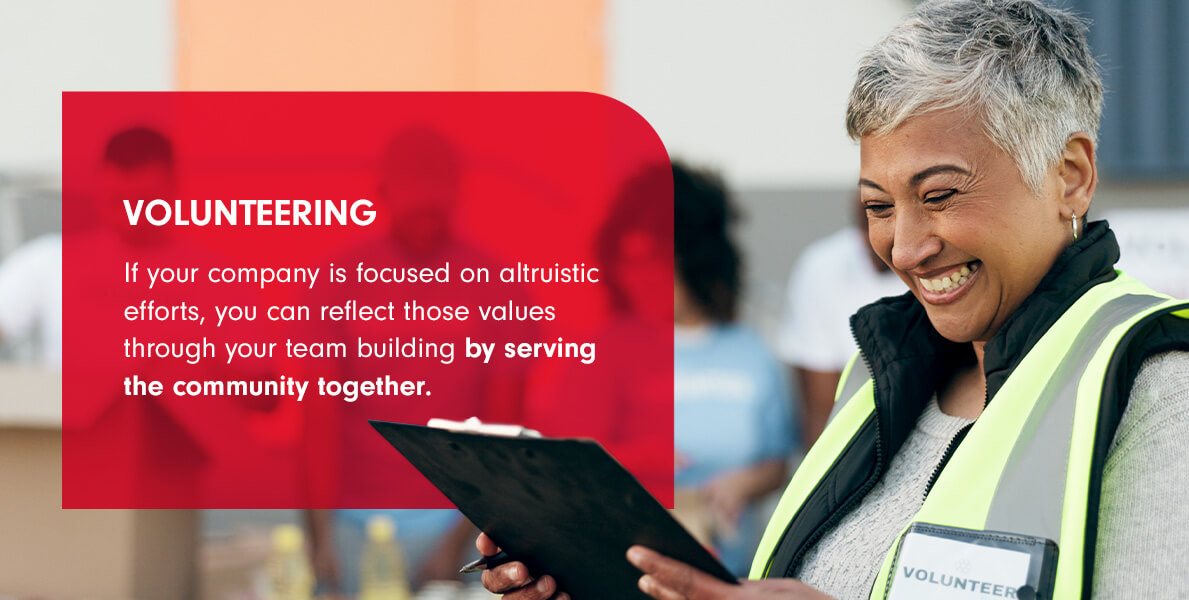
- Volunteering: If your company is focused on altruistic efforts, you can reflect those values through your team building by serving the community together. Serving as a team has the twofold effect of uniting your company and helping those in need. You can match your efforts to your brand by serving in the areas that most closely align with your values.
- Laser tag: Laser tag is a thrilling, strategic shooting game that you play in a controlled, safe environment. The game encourages teamwork, communication and strategic thinking. Laser tag also promotes physical activity but is an inclusive game that you can adapt to all levels of mobility.

- Fun classes: By going to a class together, you show your team your appreciation for them and provide everyone with the unique opportunity to learn a new recreational skill. Determine what suits your team best and then head out for the day to pickup a new skill in music, art, dance, martial arts — you name it.
- A cookout: If there is one thing that can bring everyone together, it’s food! Choose a venue that offers grills and tables to accommodate the cookout, or opt for an indoor potluck. Cookouts inspire creativity and give staff a chance to get to know each other better and form genuine bonds.
- Ziplining or kayaking: An activity like ziplining or kayaking gets your team to step outside of their comfort zone while they enjoy the beautiful backdrop of nature. Action-filled recreational activities highlight and promote leadership, encouragement, communication, decision-making and confidence.
Consider these ideas for team-building activities and games:

- Board games and trivia: Group employees in small teams — it can be by department or mixed — to test one another in a fun game of smarts. Board games or trivia games bring individuals out of their shells and foster communication.
- Egg drop: Teams work together to protect an egg from a high drop! In teams, members find creative ways to protect an egg well enough for it to survive a drop from a height, such as cardboard boxes, tissue paper or newspaper. Make sure to provide everyone with sufficient materials and then let them get to work. The enjoyable exercise promotes teamwork and team spirit — there are bound to be lots of laughs as many of the eggs don’t make the fall!
- Minefield: Minefield is a game where teams set up obstacle courses and guide a blindfolded member through the obstacles using verbal instructions only. All you need is an empty office or hallway and a collection of office supplies like cardboard boxes, chairs, stacks of paper or water bottles to set up the obstacle course. Team members build trust, communication skills and listening skills, all while working in a team to get to the other side of the challenge.
- What’s My Name?: This simple game only requires some sticky notes, markers, a little creativity and some basic trivia knowledge to play. Write down the names of famous people or well-known characters from literature, film or art on sticky notes and add that to a container. Each member reaches in without looking and sticks the sticky note with the name on their forehead. Participants then need to mingle with each other and ask various questions to help them figure out who they are!
- Sneak a Peek: For this activity, provide various supplies so that staff can build interesting structures. You can provide anything from building blocks and clay to lego, tape, glue and trinkets. Make sure you have enough of each supply because others are going to try to recreate the structure. Form teams of at least four members each, then designate one member to build the structure in about 5 minutes while their teammates are blindfolded. When done, one member takes off their blindfold to get a sneak peek of the design for 10 seconds — remembering as much as they can to recount to their team members until they are confident they have the best recreation.

- Two Truths, One Lie: Two Truths One Lie is a simple icebreaker that helps your group bond. In one large group or in various smaller groups, have participants take turns sharing two truths about themselves and one lie — in varying orders. It’s up to the rest of the group to determine which statement is the lie.
- Concentration: Concentration is an excellent game for focus, and you can use it for building brand awareness and getting to know the team better. You will need 30 numbered tiles placed randomly on a board, each tile with a matching twin. Team members get a chance to call out a number to turn a tile temporarily and must remember where each tile is so that they can match the pair. It’s a great exercise for focus and collaboration, and you can also use the tiles to place company logos, pictures of policies or your team members’ names with interesting tidbits like their hobbies or how many kids they have.
- Game of Possibilities: Write down a number of random objects on scrap paper and place them in a bowl. Each team member draws a paper and must demonstrate — without talking — what their object is used for. Other team members take turns guessing what the object is. A game of possibilities fosters communication and team spirit.
- Scavenger hunt: A good old scavenger hunt is perfect for developing problem-solving skills as a team. Your groups work together to solve clues that lead to the ultimate prize.
Evaluating Your Success: Measuring the Impact of Corporate Team Building Activities
The final step to executing fruitful team building is evaluating the process with employee feedback. Asking for feedback in stages is an excellent way to determine the outcome of the event. You can ask for feedback on the day, at the end of the activities and again in a week and a month’s time. Spreading the feedback over a longer time frame can show you how successful some of the tasks are in the long term.
Key Performance Indicators for Assessing Team Building Success
When asking for feedback, focus on questions that can help ascertain the success of the various components. You may consider asking your staff some of these questions:
- How much fun did you have at the event?
- On a scale of 1 to 10, how effective did you find the activities?
- Do you feel that you bonded with your team? Did you form any new professional connections?
- How valuable were the resources?
- Did you learn any new skills at the team building?
- Were the gifts and prizes suitable?
- How would you rate the venue?
- Think forward to the next event — what would you keep the same and what would you do differently?
Building a Stronger Corporate Culture With ePromos
Are you ready to create a better corporate culture and host more fruitful team-building functions? Start elevating your corporate team building with ePromos today!
At ePromos, we offer a wide selection of premium corporate and promotional gifts. We have a wide variety of products to suit your unique team-building event and the different members of your team. Browse our extensive online store for office supplies, custom-branded apparel, tech accessories, health and well-being items, gift baskets and so much more. Start shopping for gifts today, or contact our friendly brand consultants with questions about our speedy rush service and other options!







